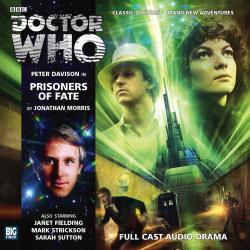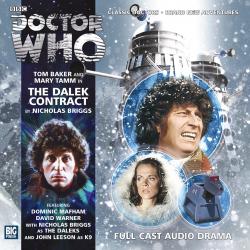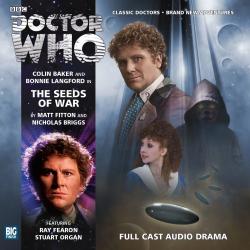Prisoners of Fate (Big Finish)
Monday, 8 July 2013 - Reviewed by

Prisoners of Fate
Big Finish Productions
Written by Jonathan Morris
Directed by Ken Bentley
Released June 2013
Tegan Jovanka, Prisoners of Fate
For a TV program celebrating its 50th anniversary, it is remarkable, although not necessarily surprising, how many great, similar ideas pervade Doctor Who across its other media – print, comic strip or audio drama. Some ingenious concepts and visuals in the spin-offs are often developed quite coincidentally of the TV series (the primary source) but are inevitably trumped by the parent program.
Indeed, as if the parent program doesn’t have enough of its own continuity to draw from, it has since its return in 2005 drawn inspiration from its spin-offs. The recent Season 7 finale The Name of the Doctor repeated some ideas that were first mooted by Virgin Books’ New Adventures range in the 1990s. Paul Cornell adapted his original NA Human Nature into a two-part serial for David Tennant’s Doctor in 2007. Key ideas in some of Big Finish’s audio dramas in the early ‘00s were also “borrowed” by the TV series, notably from Marc Platt’s Cyberman origin tale Spare Parts and Robert Shearman’s Jubilee (the famous cell scene of Dalek – in which the Doctor realises his cellmate is one of the creatures – happened in Jubilee first!).
The latest Doctor Who audio release Prisoners of Fate – if it had been released a year ago - would probably be hailed by fans as a classic of the audio range. It is an intelligent and cleverly thought out story, with some truly brilliant ideas and visuals and a wonderful villain. Unfortunately, coincidence can, to put it crudely, be a “bitch”. I suspect Jonathan Morris conceived of Prisoners of Fate at least a year ago so who couldn’t forgive him for feeling a little miffed that his story and ideas have been trumped by none other than the Season 7 finale?
For the sake of the readers of this review, I will discuss the more obvious aspects of the plot first but warn it is hard to comment on this story without touching on potential spoilers (which I will return to). I can talk more freely about the “B” and “C” plots - even if they are actually presented as the “A” plot in all the publicity for the story and on the CD sleeve. The Doctor and his companions touch down on Valderon after the TARDIS is drawn there by a temporal anomaly. The incongruity appears to be a Chronoscope, which the colony uses to police its society in a manner that is reminiscent of the Philip K Dick short story (and subsequent movie) The Minority Report. The Doctor’s companion Nyssa is also reunited with her son Adric 25 years after she went missing, presumed dead.
While it is not essential, it helps if you have scrubbed up on Jonathan Morris’ earlier BF outing Cobwebs which reunited Nyssa with the Fifth Doctor, Tegan and Turlough some 50 years (in her personal timeline) after she first left the TARDIS crew in the TV serial Terminus. The “B” plot, nevertheless, reinforces just how much of an indirect impact the Doctor’s meddling can have on not just the lives of a 15-year old boy but his whole family and the galaxy at large. Not only does the Doctor’s reunion with Nyssa rob her family of their mother but it means she is also not able to provide the crucial antidote to Richter’s Syndrome that she originally sought and discovered in Cobwebs. The effects of the Doctor’s interference are disastrous, with billions across the galaxy having succumbed to the virus. Prisoners of Fate also revisits some of the themes that were touched upon in the TV serial The Angels Take Manhattan and to a lesser degree the preceding BF release The Lady of Mercia – that once the Doctor and his companions arrive in a given time and place, they are at risk of learning about their own futures and becoming ensnared in the web of time.
However, as it becomes clear by the half-way point of the story, the Chronoscope sub-plot, together with the notion of imprisonment on the premeditation of murder, is a red herring. It’s a little disappointing that Morris does not explore this in more depth – however, if he had done so, I suspect it would have been an entirely different story. Similarly, there is the potential for Adric’s experiments on Valderon’s prisoners to alienate him from his mother but that too could also make up another story. As it is, the Nyssa/Adric reunion is also a clever distraction from the raison d’etre.
The true “A” story to Prisoners of Fate features many similarities (at least on a superficial level) to Season 7 finale The Name of the Doctor – most notably that both stories involve a villain from the Doctor’s past who threatens the Time Lord’s very existence (and with it the web of time) and that the key to his survival is one of his companions. There are also some strong, impressive visuals to the story, set on the penal planet Valderon, that also bear an uncanny resemblance to imagery on Trenzalore. More than likely I’ve already said too much and to say any more would be to spoil the listener’s enjoyment of the story on its own merits and independently of The Name of the Doctor.
As we’ve come to expect from Big Finish dramas, the scale and quality of the production is almost flawless. The regulars and the guest cast are very impressive in bringing the story to life. While they comment in the CD extras just how complex this tale is to understand (compared to The Lady of Mercia), Peter Davison, Janet Fielding, Sarah Sutton and Mark Strickson through their energetic performances really do anchor this story (and their preceding adventures) in the period of Doctor Who in which it is meant to be set (eg circa 1983-84). The guest cast are also very competent performers, even though their characters are mostly one-dimensional, a case in point being Sarah Douglas’ Prime Elector Sybor. However, as I’ve mentioned, not everything in this story is as obvious as it seems and Douglas clearly relishes the opportunity to play the story’s true villain (as do Fielding and Strickson briefly as well).
The sound effects and incidental music in Prisoners of Fate also deserve a special mention, especially the score by Fool Circle Productions. The use of haunting choral music really conveys the sense that you are (along with Tegan and Turlough at one point) visiting a haunted medieval castle and there is also a lovely homage to Nyssa, reprising Roger Limb’s theme for the character from the TV series. It’s great to hear a suite of all this music at the end of disc one.
The problem with such an enjoyable story like this is that the bar is raised so high that the conclusion is always going to be on a hiding to nothing. The seemingly all too convenient climax is my only gripe with the tale (again I can’t risk spoilers!) but I personally like the melancholic twist in the resolution between Nyssa and her son.
Prisoners of Fate is, fittingly in Doctor Who’s golden anniversary year, virtually an unofficial anniversary story. Like The Name of the Doctor, it celebrates Doctor Who’s past and present while also challenging fans’ established knowledge with a curved ball hitherto unknown (even the villain’s name seems to inadvertently symbolise the anniversary). However, as I’ve mentioned, its impact has been diluted by the historic events of Doctor Who’s recent TV finale. It may be some time before Prisoners of Fate emerges into the limelight to be evaluated as an outstanding story in its own right.
Postscript and Spoiler Alert: If you aren’t overly bothered by the threat of spoilers, I will give out one, final cryptic hint – an alternative title for this story could be “The Doctor’s Other Wife”!









